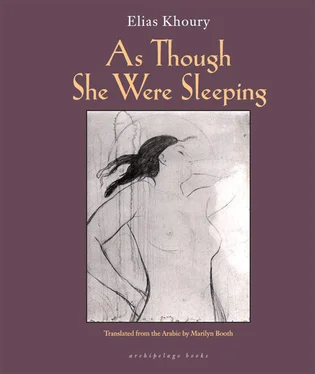How will she convince her mother that the story is not true? That it is possible to cast doubt on the words of the saintly Milana?
The saint does not lie, says the mother.
That doctor is a scoundrel! says Niqula.
But the night says things to her that she does not know how to put into words.
It’s the secret of life, she said to Mansour when, years later, he asked her why she would sleep when he made love to her.
Why don’t you respond to me when I am talking to you?
Because there are no words that say what I want to say.
That was Milia’s understanding of speech. It could never claim a hold on her, never work its magic, except when she listened to Mansour recite lines of poetry he had learned by heart. He would set his glass of arak in front of him, keeping his fingers on it, jiggling the glass until a milky cloud rose to fill it.
Now this is arak as it should be! Thrice distilled until it is as pure and clear as the tears in your eyes. Look at that milkiness around the edges, like a beautiful fog. Love, milk, tears!
He stares into his wife’s eyes and sees a light blue film tinting the whiteness.
What has passed beyond us is ever coming
and what is yet to come has passed and gone
Mansour takes a sip as if his lips are kissing the rim of the glass, and recommences.
Do you like Mutanabbi’s poems? he asks.
For your eyes — all my heart’s seen and suffers
For love — all I’ve lost or still have
I was not one whose heart passion entered
But seeing your orbs, one must love
The lines of ancient poetry well up and flow from his lips — love lyrics upon wine-poems, elegy following panegyrics. He will name his first son Amr, he declares. A-m-r-w. .
Amrw — that’s not a very nice-sounding name.
No, woman, not like that — you don’t pronounce the letter waw . It’s there to soften the ra . I’ll name my son Amr — say it lightly, Amr! — in honor of the poet Amr son of Kulthum. He was a well-known, well-respected figure in the Banu Taghlib. If it hadn’t been for Islam, those “Sons of Taghlib” would have eaten the Arabs alive — they were overrunning the Arab lands! So, we name him Amr, and then you can be Umm Amr and I can really give you some love poems. Listen to this one.
May God forgive you, Umm Amr, and keep you!
Return my heart as it was to remain
Your black eyes ringed in crystal’d white verges
Slayed me and revived not the slain
Me!
Yes of course, you — who else? Here, have a sip.
He brought his glass to her lips. She drank a little and felt a cough coming on but she swallowed it. She turned to Mansour. Me! Hawal! Are my eyes crossed?
No, no, not crossed, crystal’d. Hawar , not hawal. Hawar means beauty. It means fair. Meaning, the loveliest thing in the whole world. Dazzling white around a deep black core. Like Daad. Do you remember her? Remember the poem?
Please — I really don’t like this kind of talk.
A delicate mound she has, and its touch
is intricate to find, its contour to mount
Pierce it, you enter a warm woolen cloud
Pull away, and it draws closed behind you
Do you know what it means? he asked her.
Let’s forget it! Yallah , I want to go to sleep.
Hawar , my darling, means paleness. Beauty.
All you think about is this stuff.
When I saw you beneath the almond tree, a fellow with you –
You saw me?
Of course I saw you, and the almond blossoms looked like a crown circling your head. Like a white silk shawl, and you were standing with someone who looks like me. I went a little closer but I couldn’t make out any words. I just saw your lips, how they moved. Asal! I said to myself. Honey. The sweet jolt of honey. I swallowed my saliva and said to myself, Tomorrow. And then and there I named you Umm Amr. My mother won’t like it a bit. She wants to name the boy after my father. Shukri. Mama, I said to her, look here. My brother named his oldest boy Shukri. So? she said. Then we’ll have two Shukris. See how her mind works? She’s not quite right up there. She didn’t love my father until after he was dead. Never mind — did you tell me you liked my mother? She adores you and she told me you’re an angel. She said to me, Son, you found an angel come down from the sky. I said, Yes, but, Mama, my angel is always asleep. Milia, do you hear me? Why are your eyes closed? We’re out here, we’re not in bed.
She pressed her palms over her eyes and felt that all the words were closed. She felt unable to speak. Words were like buttons closing a long wrap covering her body. She had to undo the buttons in order to be in the world and to speak its language. But she could not figure out how to work the buttons. She had an image of herself surrounded by buttons, and Georges Nashif sitting in his little shop yawning, and a cascade of buttons on every side. Holding a button in her hand Milia stands in the shop. The girl puts out her hand and the merchant takes the button, opens a drawer and takes out a handful of buttons, which he mounds on the counter in front of her. The shop is full of colors and the world rains buttons. The little girl stands alone under the pelting shower of buttons. Georges Nashif laughs. Hands come out to pluck away the colors and Milia is beneath those hands. She cannot breathe, she’s choking. She opens her eyes and discovers that the coverlet has come off and she is shivering with cold. She covers herself and goes to sleep. She sees the long flight of steps. She falls and her brother Niqula picks her up and carries her to the clinic of the two doctors. The close aroma of spices suffocates her as hot oil glides over her legs and feet. She opens her eyes again and listens to the snoring of her little brother, Musa, asleep beside her.
Milia did not know how to tell this dream. She did not know how to live with it. She listened to her mother’s whispered insinuations, among the neighbor women, about the wickedness of the man, his persistent fishing for women, his generosity to those he found beautiful.
Why did the buttons usher in the story of the two doctors?
She wanted to say to Mansour that words are like the buttons closing a long robe and that she cannot undo them. And that is why she does not talk on and on as he wants her to. She had tried to memorize the poems her husband repeated to her but she would find the metrical patterns stumbling and finally breaking between her lips. It was as though she were walking across broken glass and the words wounded her feet.
Why don’t you talk? Mansour asked her.
The taste of blood lay under her tongue and the smell of it lingered in her nose. What do you want me to say? She gazed down at her rotund belly and felt herself dropping off to sleep in the chair so she stood up.
Are you going off to sleep? he asked her.
Sorry, leave everything where it is and tomorrow I will clear up. Right now I am too sleepy.
No, no sleep! Every evening I stay up and you’re asleep, and then when I come near you. .
She went into the bedroom, wriggled into her long blue nightgown, lay down on the bed, and closed her eyes on the image of the buttons.
The shadow-profile of the two Armenian doctors chased Milia until her final moments. The girl never understood exactly what had happened but the story as her mother told it was engraved solidly in her memory and it shaped that memory in a way that was both obscure and familiar.
Was that how it had happened, really? Or had things gotten confused in Milia’s memory, assuming the form of a story issuing from the throat of the sainted nun who cursed the two doctors? She said they had betrayed the sacred trust of medicine. They had met a just and well-deserved future in the shape of prison.
Читать дальше












